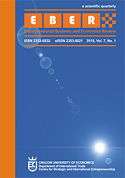A Theoretical Expansion of Talent Allocation Model: Evidence from Selected Developing Countries from 2014-2018
A Theoretical Expansion of Talent Allocation Model: Evidence from Selected Developing Countries from 2014-2018
Author(s): Rozita Moayedfar, Mohsen Madani ChafiSubject(s): Developing nations, Economic development, Present Times (2010 - today), Human Resources in Economy
Published by: Uniwersytet Ekonomiczny w Krakowie
Keywords: allocation of talent; market size; firm scale; property rights;
Summary/Abstract: Objective: The objective of this study is to propose a model for talent allocation to economic activities and rent-seeking based on some effective factors. Research Design & Methods: We examined the research model using the panel data method based on data from selected developing countries in the years 2014-2018. Findings: Our results indicated that market size, firm scale, and the quality of property rights all affect the talent allocation based on the theoretical logic of our research’s modelling. Implications & Recommendations: It seems necessary for an economy to worry about circumstances that influence the quality of property rights, market size, and firm scale in addition to human capital accumulation in order to reinforce the talents’ tendency towards productive activities rather than rent-seeking; that is, to promote economic growth. Contribution & Value Added: Moving a step forward from the quality of human sources towards allocating them as “economy talents,” we proposed a model to explain how market size, firm scale, and quality of property rights affect talents’ choice between productive activities and rent-seeking, via Romer’s quality of property rights model expansion.
Journal: Entrepreneurial Business and Economics Review
- Issue Year: 7/2019
- Issue No: 4
- Page Range: 57-72
- Page Count: 16
- Language: English

